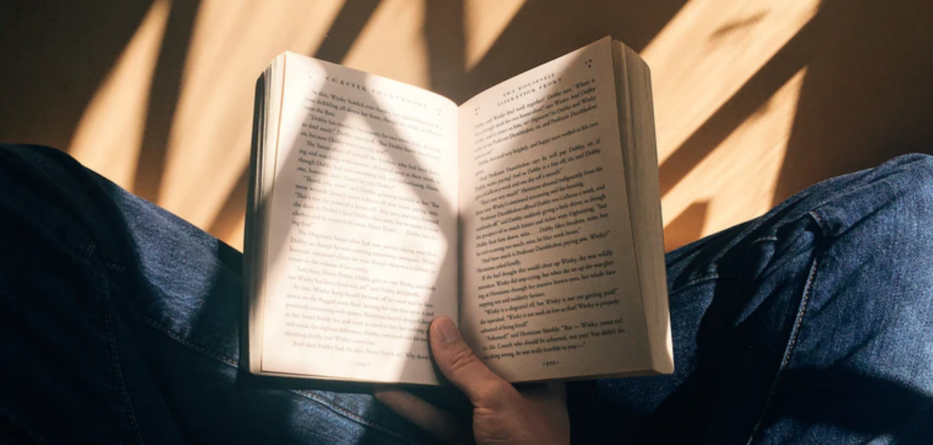In this digital age people do most of their reading on phones and other electronic devices but there is something truly special about “real” books.
The value we place on books says a lot about us.
There is a story of a boy who found a book in good condition in a yellow skip (or dumpster) down the street. His excitement, when he brought it home and showed his dad, was somewhat deflated when he was told, “What do we need a book for, we’ve got one already.”
Apocryphal I am sure, but there is a hint of truth underlying the story.
At one time, a ride on the London tube was to share the company of other passengers with their nose in a book. Now it is more than likely that it’s a Kindle or various mobile phone apps that occupy their travel time.
Yes, they might be reading. But the experience of books is different.
There is something special about a “real” book, if we might use the term. Handling a new book, opening its pages for the first time and exploring the contents is not replaceable by a screen and a swipe to turn the page.
Later, when the book has been read, it finds its place on a bookshelf or in a pile on the floor, to be retrieved when a favored passage is remembered or a quote is required.
The personal narrative
We give books to friends as presents, often writing a greeting of appreciation, thanks or encouragement on the fly leaf. It is something that has value and meaning beyond its words, it is meant to be kept.
A couple of years ago I attempted some pruning of my own bookshelves. I opened one with the inscription “Thanks for being there”. It was given to me by a pupil about to leave our primary school, a young girl from a single parent family. Her mum, a Dubliner, had struggled to give her a good life.
That book was returned to the shelf and there it remains. It is valued.
It is because books have this personal narrative that they are passed on as gifts, often after a person has died.
John Henry Newman recounted this simple story in the Apologia following the death of his friend Hurrell Froude in 1836:
I was asked to select one of his books as a keepsake …when an intimate friend at my elbow said, “Take that”. It was the Breviary which Hurrell had with him in Barbados. Accordingly, I took it, studied it, wrote my tract from it and have it on my table in constant use till this day.
I remembered that story when my own parish priest died some 25 years ago and we were sorting out his books. I was asked what I wanted. It was a volume of his Breviary that I took and still use. May he rest in peace.
The historical perspective of the last two thousand years, moving from the handwritten manuscripts through to the illuminated bibles such as the Book of Kells and the Lindisfarne Gospels has led us, through the invention of the printing press, to the explosive spread of the written word through Western Europe and beyond, a truly global effect.
The books of the New Testament give us the story of the life and mission of Jesus of Nazareth. The Acts of the Apostles and letters of Paul give us the measure of his work in those early days of the Christian Mission.
In fact, the very phrase “the Good Book” is a well-known description of the Bible, with a current estimation of some six billion in circulation.
With Lent around the corner, it’s time for a good book or two
How sad it is that so often books are the target of those who seek violent overthrow of a state or a community. Defamation of the Koran is often used to insult the Muslim faith in a very personal and derogatory way.
Treasures are lost that cannot be replaced, something is taken from the community that is part of its very life, where it came from and how it might go forward. The burning of books has so often been the mark of a totalitarian regime.
It was a prelude to the full impact of Nazism. In the Bebelplatz in Berlin there is a sunken glass plate offering visual access to a room of empty bookshelves that could hold up to 20,000 books.
That was the approximate number of books piled on that open ground in May 1933 and burnt — books, ideas and philosophies that threatened the emerging dictatorship.
We will soon be in the season of Lent. It has often been the practice to read a book or two during this 40-day period that makes us pause and reflect a while.
One such book that I have just finished is by Michael Ford, a former producer of religious programs at the BBC who is now a sought-after retreat-giver.
His recent book, Becoming the Presence of God – Contemplative Ministry for Everybody, is indeed an inspiring read and well worth taking time to explore. And keeping it on the shelf for a return visit.
Chris McDonnell is a retired headteacher from England and a regular contributor to La Croix International.
With thanks to Chris McDonnell and La Croix International, where this article originally appeared.








